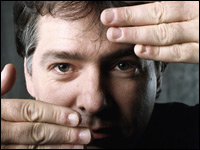I listened to two NPR podcasts driving into work that really framed my thinking for the morning in powerful ways.
The first was an NPR “This I Believe” podcast titled “I believe that my husband will call me tomorrow” by Becky Herz. For people who don’t have loved ones serving overseas in the military, podcasts like this can really add another human dimension to the headlines we most often read and hear about in mainstream media.
This episode originally aired on January 15, 2007. I think it is fantastic NPR makes short recordings like this available and accessible (text-transcriptions of many shows like this one are available online) for free.
Teachers and students studying and discussing events in the Middle East, and specifically in Iraq, should consider listening to short podcasts like this one. Often “This I Believe” episodes provide perspectives you typically don’t find when you just read or watch the news.
The second podcast was also from the “This I Believe” series, and is one I’d heard before. I picked up something new the second time I heard it, however. This one is titled “Doing Things My Own Way” by Bela Fleck, from September 25, 2006. Bela talks about his experiences as a musician and banjo player, and the example his grandfather set for him creatively solving problems and running two businesses without the advantage of a college education. He wrote and said:
I didn’t learn to play bluegrass, classical music or jazz in school. I took banjo lessons from some of the best, but my breakthrough moments came when I left the lesson plans.
That statement resonates with me: “My breakthrough moments came when I left the lesson plans.” In educational contexts, I think our breakthrough moments with students often come from “teachable moments” when we deviate from the scripted lesson plans, and investigate ideas the students are genuinely interested in and have lots of questions about.
One of the most important reasons to continue working toward reforming our educational system is to provide more TIME for learning. Learning is a complex, webby, organic and non-linear process for all of us. Computer technologies should help us genuinely differentiate learning experiences as well as more powerfully assess (on an ongoing basis) the learning, skills, and understandings being developed by the learners in our charge. The fundamental problem with our current factory-based model of learning in most K-12 schools as well as many universities is the non-differentiated nature of the curriculum. Differentiated learning is something all students need and deserve, whether they have an IEP or not, and whether they are attending a free public or expensive private institution.
I love to hear musicians talk about their creative processes for developing new ideas and performing. We need to emphasize creativity more in our schools. Consider giving Bela’s podcast a listen, and then sharing it with your students. The conversations which ensue might be extremely worthwhile. Not everything we need to know is taught in schools, and not everyone who is “successful in life” acquired their skills, dispositions, and attitudes in formal educational settings.
It’s great to be able to learn from people like Becky and Bela.
Technorati Tags: creativity, education, educationreform, iraq, npr, podcasting, school2.0, schoolreform
If you enjoyed this post and found it useful, subscribe to Wes’ free newsletter. Check out Wes’ video tutorial library, “Playing with Media.” Information about more ways to learn with Dr. Wesley Fryer are available on wesfryer.com/after.
On this day..
- Great reason NOT to use iBuildApp – 2014
- eBooks Sandbox: a space to share free eBook experiments! – 2012
- Secret iPhone Agreement (now public) and Apple User Ethics – 2010
- Platforms for idea sharing are essential (even family learning blogs) – 2010
- A projector in my pocket and a Netbook in my satchel – 2009
- Disrupting Class: How Disruptive Innovation Will Change the Way the World Learns (CoSN 2009 closing keynote) – 2009
- Empowering 21st Century Superintendents to Achieve a Culture of Transformation through Technology – 2009
- The Sugar User-Interface Opportunity by Anne Gentle – 2009
- Google Apps: Implementation and Changing the Way We Do Business – 2009
- Navigating Beyond the Now: The Force, Trends, and Signals that will impact Learning in the Next Decade – 2009


